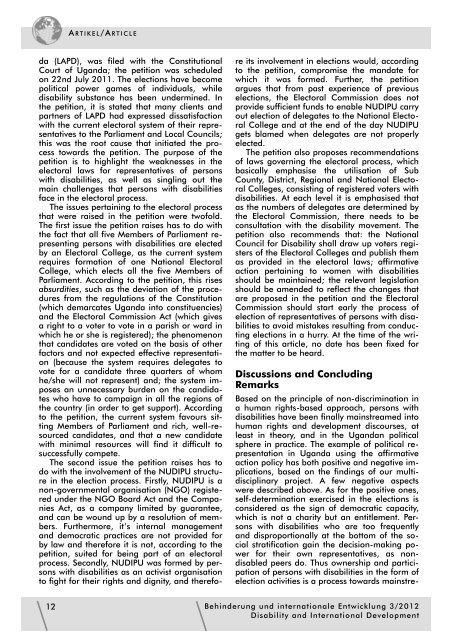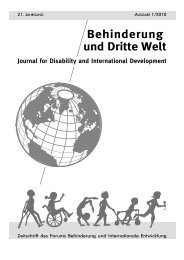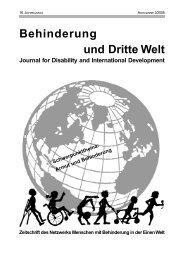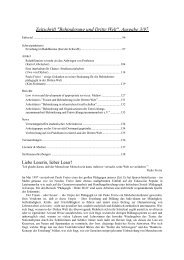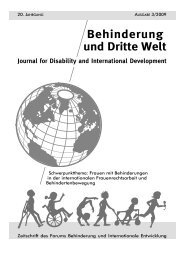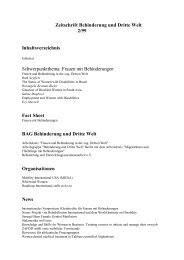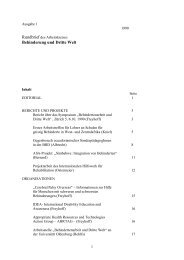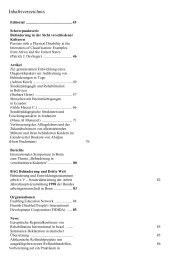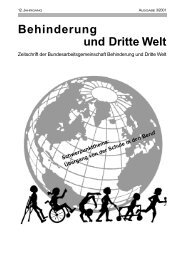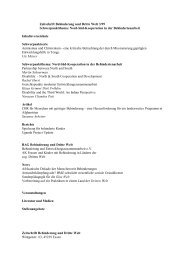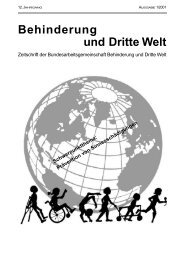Behinderung und internationale Entwicklung Disability and ...
Behinderung und internationale Entwicklung Disability and ...
Behinderung und internationale Entwicklung Disability and ...
Create successful ePaper yourself
Turn your PDF publications into a flip-book with our unique Google optimized e-Paper software.
A RTIKEL/ARTICLEda (LAPD), was filed with the ConstitutionalCourt of Ug<strong>and</strong>a; the petition was scheduledon 22nd July 2011. The elections have becomepolitical power games of individuals, whiledisability substance has been <strong>und</strong>ermined. Inthe petition, it is stated that many clients <strong>and</strong>partners of LAPD had expressed dissatisfactionwith the current electoral system of their representativesto the Parliament <strong>and</strong> Local Councils;this was the root cause that initiated the processtowards the petition. The purpose of thepetition is to highlight the weaknesses in theelectoral laws for representatives of personswith disabilities, as well as singling out themain challenges that persons with disabilitiesface in the electoral process.The issues pertaining to the electoral processthat were raised in the petition were twofold.The first issue the petition raises has to do withthe fact that all five Members of Parliament representingpersons with disabilities are electedby an Electoral College, as the current systemrequires formation of one National ElectoralCollege, which elects all the five Members ofParliament. According to the petition, this risesabsurdities, such as the deviation of the proceduresfrom the regulations of the Constitution(which demarcates Ug<strong>and</strong>a into constituencies)<strong>and</strong> the Electoral Commission Act (which givesa right to a voter to vote in a parish or ward inwhich he or she is registered); the phenomenonthat c<strong>and</strong>idates are voted on the basis of otherfactors <strong>and</strong> not expected effective representation(because the system requires delegates tovote for a c<strong>and</strong>idate three quarters of whomhe/she will not represent) <strong>and</strong>; the system imposesan unnecessary burden on the c<strong>and</strong>idateswho have to campaign in all the regions ofthe country (in order to get support). Accordingto the petition, the current system favours sittingMembers of Parliament <strong>and</strong> rich, well-resourcedc<strong>and</strong>idates, <strong>and</strong> that a new c<strong>and</strong>idatewith minimal resources will find it difficult tosuccessfully compete.The second issue the petition raises has todo with the involvement of the NUDIPU structurein the election process. Firstly, NUDIPU is anon-governmental organisation (NGO) registered<strong>und</strong>er the NGO Board Act <strong>and</strong> the CompaniesAct, as a company limited by guarantee,<strong>and</strong> can be wo<strong>und</strong> up by a resolution of members.Furthermore, it’s internal management<strong>and</strong> democratic practices are not provided forby law <strong>and</strong> therefore it is not, according to thepetition, suited for being part of an electoralprocess. Secondly, NUDIPU was formed by personswith disabilities as an activist organisationto fight for their rights <strong>and</strong> dignity, <strong>and</strong> thereforeits involvement in elections would, accordingto the petition, compromise the m<strong>and</strong>ate forwhich it was formed. Further, the petitionargues that from past experience of previouselections, the Electoral Commission does notprovide sufficient f<strong>und</strong>s to enable NUDIPU carryout election of delegates to the National ElectoralCollege <strong>and</strong> at the end of the day NUDIPUgets blamed when delegates are not properlyelected.The petition also proposes recommendationsof laws governing the electoral process, whichbasically emphasise the utilisation of SubCounty, District, Regional <strong>and</strong> National ElectoralColleges, consisting of registered voters withdisabilities. At each level it is emphasised thatas the numbers of delegates are determined bythe Electoral Commission, there needs to beconsultation with the disability movement. Thepetition also recommends that: the NationalCouncil for <strong>Disability</strong> shall draw up voters registersof the Electoral Colleges <strong>and</strong> publish themas provided in the electoral laws; affirmativeaction pertaining to women with disabilitiesshould be maintained; the relevant legislationshould be amended to reflect the changes thatare proposed in the petition <strong>and</strong> the ElectoralCommission should start early the process ofelection of representatives of persons with disabilitiesto avoid mistakes resulting from conductingelections in a hurry. At the time of the writingof this article, no date has been fixed forthe matter to be heard.Discussions <strong>and</strong> ConcludingRemarksBased on the principle of non-discrimination ina human rights-based approach, persons withdisabilities have been finally mainstreamed intohuman rights <strong>and</strong> development discourses, atleast in theory, <strong>and</strong> in the Ug<strong>and</strong>an politicalsphere in practice. The example of political representationin Ug<strong>and</strong>a using the affirmativeaction policy has both positive <strong>and</strong> negative implications,based on the findings of our multidisciplinaryproject. A few negative aspectswere described above. As for the positive ones,self-determination exercised in the elections isconsidered as the sign of democratic capacity,which is not a charity but an entitlement. Personswith disabilities who are too frequently<strong>and</strong> disproportionally at the bottom of the socialstratification gain the decision-making powerfor their own representatives, as nondisabledpeers do. Thus ownership <strong>and</strong> participationof persons with disabilities in the form ofelection activities is a process towards mainstre-12<strong>Behinderung</strong> <strong>und</strong> <strong>internationale</strong> <strong>Entwicklung</strong> 3/2012<strong>Disability</strong> <strong>and</strong> International Development


